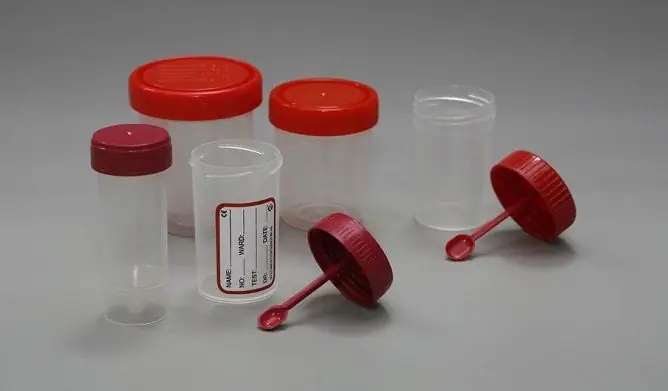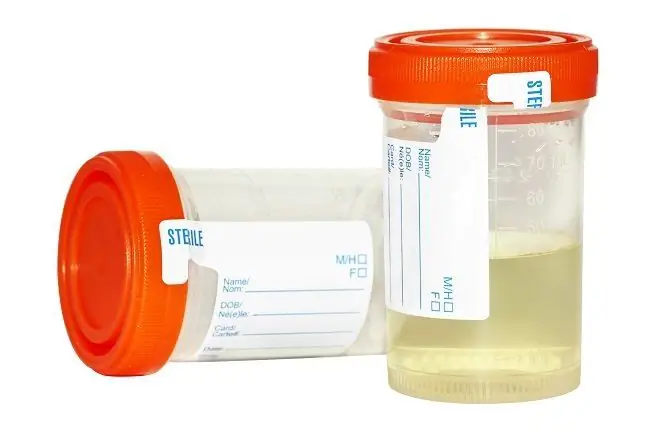- Author Rachel Wainwright wainwright@abchealthonline.com.
- Public 2023-12-15 07:39.
- Last modified 2025-11-02 20:14.
Stool analysis: how much stool can be stored in the refrigerator and how to collect it correctly
The content of the article:
- How to properly collect feces for research
-
Features of storage of material depending on the types of research
- General analysis of stool: how much stool can be stored in the refrigerator?
- Stool preservation for analysis for worm eggs
- Collection and storage of feces for analysis for dysbiosis
The accuracy and information content of the obtained analysis result largely depends on how correctly the preparation and collection of biological material and its storage until delivery to the laboratory are carried out.

For collection and storage of feces, it is advisable to use only a specially designed disposable container For collection and storage of feces, it is advisable to use only a specially designed disposable container.
It is best to collect feces for research in the morning and immediately deliver them to the laboratory. However, this is not always the case, some people have bowel movements during the day or in the evening, and children can empty their bowels at any time of the day. Therefore, the question of how long the collected material can be stored and under what conditions is very relevant.
How to properly collect feces for research
Patients are advised to begin a lactic-vegetable diet one week prior to stool testing, which improves motor function and allows daily bowel movements. Strict adherence to the diet is especially important in the case of an upcoming study of feces for occult blood using the benzidine test.
To collect feces, you should prepare a disposable container in advance (it can be taken from a laboratory or bought at a pharmacy) or a small glass jar with a lid. The jar should be thoroughly washed with hot water and baking soda, then rinsed with boiling water or steamed and dried. However, it is better to use a disposable sterile container with a special spoon built into its lid, especially if a bacteriological examination or analysis of feces for dysbiosis is scheduled. Many laboratories refuse to accept material for research in any other container than the standard one.
Also, a pot or vessel should be prepared in advance, where bowel movements will be carried out. They must be thoroughly washed, rinsed with boiling water and dried. In infants, feces are taken from a diaper or diaper.
Immediately before defecation, you should empty the bladder and conduct a thorough toilet of the genitals. After emptying the intestines with a spoon built into the lid of the container, a small volume of fecal matter, approximately 2-3 cm 3, is taken from several places. They should be placed in a container and then tightly closed with a lid.
The delivery of feces for analysis is undesirable on the days of menstrual bleeding in women, as well as earlier than 48 hours after performing diagnostic or therapeutic procedures affecting the intestines (enemas, colonoscopy, sigmoidoscopy, contrast fluoroscopy of the stomach and intestines).
If the patient is taking laxatives, sorbents, or using rectal suppositories, then the stool test should be taken no earlier than 72 hours after the last intake.
Features of storage of material depending on the types of research
To assess the functions of the digestive system, to identify bacterial infections and helminthic invasions, various types of laboratory studies of feces are performed:
- general (clinical) analysis, or coprogram;
- analysis of feces for helminth eggs;
- bacteriological research;
- research on dysbiosis;
- analysis for occult blood.
The answer to this question, how many hours it takes to deliver the collected feces to the laboratory, also depends on what kind of research will be carried out.

If it is impossible to deliver feces for analysis immediately, it is allowed to store it in the refrigerator for several hours If it is impossible to deliver feces for analysis immediately, it is allowed to store it in the refrigerator for several hours
General analysis of stool: how much stool can be stored in the refrigerator?
The shelf life of fresh stool for the coprogram does not exceed eight hours, provided it is stored on the middle shelf of the refrigerator in a tightly closed container. The middle shelf of the refrigerator provides a temperature regime of 4-8 ° С. Under no circumstances should the container with biomaterial be placed in the freezer or on the side shelf of the refrigerator. Subzero temperature in the first case or frequent temperature changes as a result of opening and closing the refrigerator in the second negatively affect the natural parameters of feces, which will lead to a distortion of the analysis result. It is quite possible to store material on the middle shelf of the refrigerator from evening to morning. The main thing is that the storage time of feces at room temperature is minimal, ideally it should not exceed 15-20 minutes.
Stool preservation for analysis for worm eggs
To study feces for helminth eggs, the material must be as fresh as possible. This is due to the fact that during long-term storage, the digestive enzymes contained in the feces cause lysis (dissolution) of the shell of the eggs of parasites, as a result a false negative result is obtained. In this case, special preservatives are used to increase the storage time of the material. The container with them should be obtained in advance from the laboratory where the analysis will be carried out. When using a preservative, feces on worm eggs can be stored in the refrigerator for 4-6 hours.
Collection and storage of feces for analysis for dysbiosis
Analysis of feces for dysbiosis is a microbiological study of the characteristics of the microbial flora of the human intestine, which makes it possible to assess the relationship between three groups of microorganisms:
- useful (colibacteria, bifidumbacteria and lactobacilli);
- opportunistic (staphylococci, enterobacteria, fungi, clostridia);
- pathogenic (shigella, salmonella).
Even minor violations of the rules for collecting fecal masses or storing them before delivery to the laboratory lead to a change in this ratio. As a result, the informative value of the obtained research result sharply decreases, which can cause misdiagnosis and, accordingly, incorrectly prescribed treatment.
Feces for testing for bacteriosis should be collected prior to starting chemotherapy or antibacterial therapy. If for some reason this is not possible, then at least 12 hours should elapse after the last dose of the drug.
72 hours before taking the material, the patient is discontinued all types of laxatives, including vaseline or castor oil, as well as any rectal drugs. Feces obtained after X-ray examination of the intestines using contrast or enema are not suitable for examination.
The vessel where the defecation will be carried out is thoroughly washed with hot water, rinsed with a disinfectant solution (0.5% chloramine solution, pale pink solution of potassium permanganate, furacilin solution), then doused with boiling water and dried.
In the morning, the patient urinates in the toilet, then conducts the toilet of the genitals. After self-defecation in a bedpan with a spoon built into the lid of a disposable container for biomaterial, feces are taken from several areas and placed in a container, filling it by 1/3 of the volume, and closed with a lid.

The reliability of the analysis result depends on how much the rules for collecting and storing feces are followed The reliability of the analysis result depends on how much the rules for collecting and storing feces are followed.
Feces for analysis for dysbiosis must be delivered to the laboratory no later than three hours after collection. During this entire time, it is advisable to store the container at a temperature of 4-8 ° C, overlaying it with ice cubes or placing it in a refrigeration bag. In extreme cases, stool can be stored in the refrigerator for up to 5-6 hours, but the reliability of the result is considered reduced.
Mandatory conditions for collecting and storing feces for analysis for dysbiosis:
- prevention of freezing of feces;
- preventing the storage of the collected material before sowing on nutrient media for more than 6 hours;
- use for collection of material only obtained in the laboratory or purchased from a pharmacy a sterile single-use container;
- storage and transportation of feces to the laboratory only in a tightly closed container.
YouTube video related to the article:

Elena Minkina Elena Minkina Doctor anesthesiologist-resuscitator About the author
Education: graduated from the Tashkent State Medical Institute, specializing in general medicine in 1991. Repeatedly passed refresher courses.
Work experience: anesthesiologist-resuscitator of the city maternity complex, resuscitator of the hemodialysis department.
Found a mistake in the text? Select it and press Ctrl + Enter.






